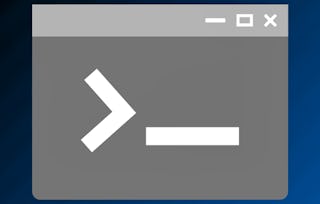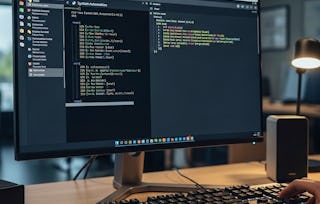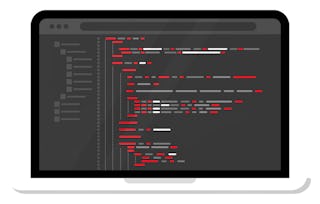This course is designed to explore how to execute Python locally and organize and use code across different Python files. Learners will learn how to read and write different types of files, use subprocesses and input streams, create Bash scripts, and use regular expressions. This course also covers automatic testing and explains how to set up a developer environment on a personal machine.

Using Python to Interact with the Operating System

Using Python to Interact with the Operating System
This course is part of Google IT Automation with Python Professional Certificate

Instructor: Google Career Certificates
Access provided by Abu Dhabi National Oil Company
294,665 already enrolled
6,627 reviews
What you'll learn
Setup, configure, and use your own developer environment in Python
Manipulate files and processes running on the Operating System using Python
Understand and use regular expressions (regex), a powerful tool for processing text files
Know when to choose Bash or Python, and create small scripts using Bash
Skills you'll gain
Details to know

Add to your LinkedIn profile
24 assignments
See how employees at top companies are mastering in-demand skills

Build your Support and Operations expertise
- Learn new concepts from industry experts
- Gain a foundational understanding of a subject or tool
- Develop job-relevant skills with hands-on projects
- Earn a shareable career certificate from Google

There are 7 modules in this course
In this module, you’ll learn about the different types of operating systems, and how you can get your python code ready to interact with the operating system. We’ll learn about getting your environment set up and installing additional Python modules that will help you along the way. We’ll rundown interpreted versus compiled language, and how they differ from each other. We’ll dive into the benefits of automation, and point out common pitfalls so you can avoid them. Finally, we’ll learn about Qwiklabs, which will be used for graded assessments.
What's included
15 videos6 readings4 assignments
In this module, you’ll learn about reading and writing to files and the commands that will enable you to do this. We’ll learn the importance of managing files and how we can navigate through different directories. You’ll understand how to work with files and how there is a layer of abstraction between Python and the operating system. Finally, we’ll dive into learning about CSV files and how to best utilize them.
What's included
15 videos16 readings4 assignments1 app item1 ungraded lab
In this module, you’ll learn about what a regular expression is and why you would use one. We’ll dive into the basics of regular expressions and give examples of wildcards, repetition qualifiers, escapare characters, and more. Next up, we’ll explore advanced regular expressions and deep dive on repetition qualifiers. You’ll tackle new exercises like capturing groups and extracting PIDs using regexes. Finally, we’ll provide a study guide to serve as your go-to guide for regular expressions.
What's included
14 videos14 readings4 assignments1 app item
In this module, you’ll learn about reading and writing to data files based on an interaction with the user. Along the way, we’ll dive into standard streams, environment variables, and command line arguments. Next, we’ll jump into Python subprocesses, including system commands and how they can be used. We’ll review how to obtain output from a system command, and dive into subprocess management, including how to check exit values and manipulate the normal versus error exit values. Finally, we’ll rundown processing log files, and will cover what a log file is, how to filter log files using regular expressions, and how to understand the output captured from log files.
What's included
12 videos13 readings4 assignments1 app item
In this module, you’ll learn how to create tests in Python. We’ll cover what testing is all about and dive into the differences between manual versus automated testing. Next, we’ll explore what unit tests are intended to do and how to write them. Then, we’ll learn about other test concepts like black box versus white box tests and how test-driven development can frame how you design and write your code. Finally, you’ll learn about errors and exceptions, and how to combat them.
What's included
14 videos16 readings3 assignments1 app item2 ungraded labs
In this module, you’ll be exposed to what the Linux OS has to offer and you'll learn about Bash scripting. We’ll go over basic Linux commands and explore the many processes Linux has to offer, including a key concept called redirection. We’ll then deep dive into creating Bash scripts using variables and globs. Finally, we’ll learn about advanced Bash concepts and develop an understanding of when to use Bash versus Python.
What's included
13 videos17 readings4 assignments1 app item
In this module, you’ll put everything you’ve learned so far into action! You’ll apply your scripting knowledge to tackle a challenging final project: writing a script that scans for a specific error in the log files. You'll create a problem statement to understand the challenge, conduct some research to see what options are available, then begin planning how you intend to solve the problem. Lastly, you'll write the code to implement your solution!
What's included
6 videos3 readings1 assignment1 app item
Earn a career certificate
Add this credential to your LinkedIn profile, resume, or CV. Share it on social media and in your performance review.
Instructor

Offered by
Why people choose Coursera for their career

Felipe M.

Jennifer J.

Larry W.

Chaitanya A.
Learner reviews
- 5 stars
78.23%
- 4 stars
15.87%
- 3 stars
3.48%
- 2 stars
1.26%
- 1 star
1.13%
Showing 3 of 6627
Reviewed on Feb 22, 2021
This course was very challenging and I think the labs could use some TLC, but covered good topics and I feel like I have learned about operating systems and how to make my code more functional.
Reviewed on Oct 15, 2021
Perfect! Windows users might face some difficulties at start. I recommend everyone to install Ubuntu on VM. It will help you a lot. Thanks for sharing your valuable knowledge with us!!!
Reviewed on Oct 8, 2020
Generally good course, but comparing to the Crash course on Python reading materials were simply links to Python docs till the very end. Nonetheless, I learned so much here. Thank you!
Explore more from Information Technology

Duke University




